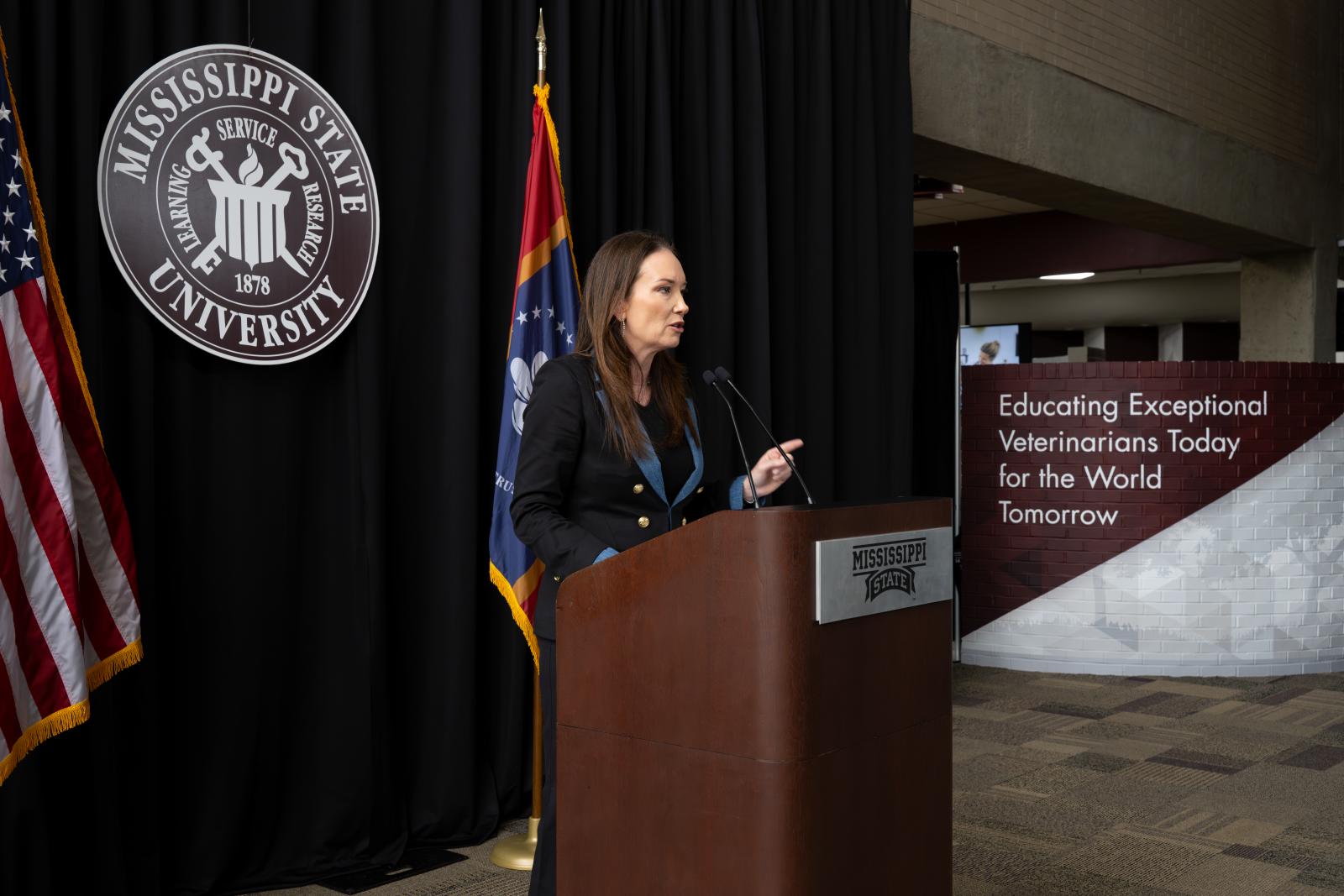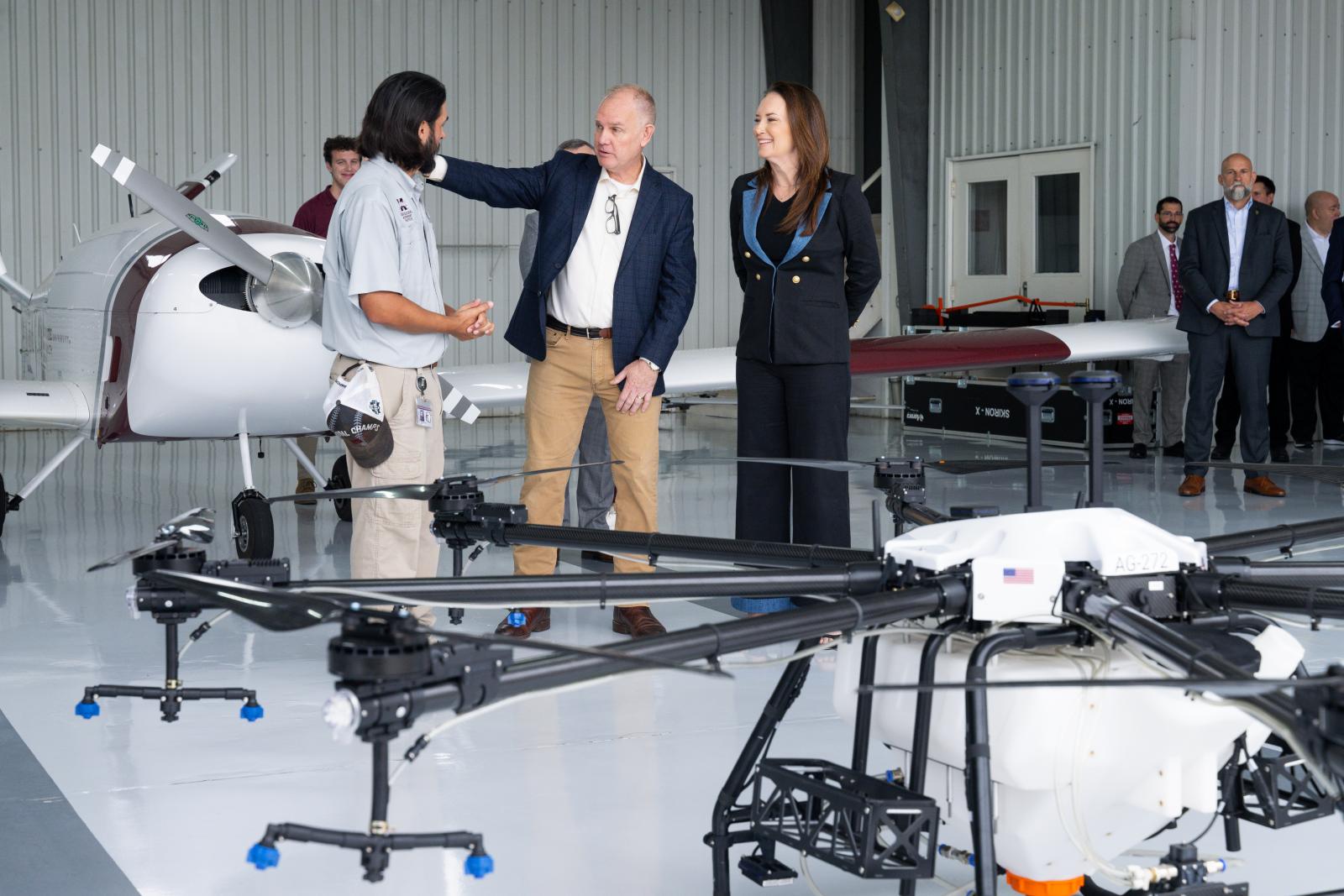
Contact: Allison Matthews
STARKVILLE, Miss.—U.S. Secretary of Agriculture Brooke Rollins announced today [Aug. 28] a Rural Veterinary Shortage Action Plan to address critical needs relating to food animal health and large animal care in rural areas during her visit to Mississippi State University.
“Being here at Mississippi State feels like coming home,” Rollins said. “Mississippi State is truly leading the way in cutting-edge technology as we fight for food security and farm security, meaning national security. We have no country if we cannot feed ourselves.”
(Video by Sarah Kirk)
While visiting MSU with U.S. Sen. Cindy Hyde-Smith, Rollins was briefed on the university’s leading research on Uncrewed Aircraft Systems, as well as its groundbreaking work in the area of agriculture autonomy. She viewed the country’s largest and most capable fleet of UAS in academic use and also learned about university advancements in the areas of antimicrobial resistance, aquaculture and fisheries, poultry and laminitis research.
During her time at MSU’s College of Veterinary Medicine, Rollins observed an equine emergency surgery in progress before making her announcements regarding the nationwide shortage in rural veterinary practice.
![From left, U.S. Secretary of Agriculture Brooke Rollins, Mississippi State University President Mark E. Keenum, U.S. Sen. Cindy Hyde-Smith and Mississippi Farm Bureau Federation President Mike McCormick pictured today [Aug. 28] at MSU’s College of Veterinary Medicine following Rollins’ announcement of a Rural Veterinary Shortage Action Plan.](/sites/www.msstate.edu/files/styles/msstatedrupal_large/public/2025-08/B9W_9557.jpg?itok=lDpAPtrs)
“Limited access to vet care is more than an inconvenience, it’s a direct threat to herd health and livelihoods. That’s why the USDA will continue to build significant partnerships with states, universities and farm groups to increase the number of veterinarians across rural America,” Rollins said.
Hyde-Smith referenced her own family’s Brookhaven stockyard.
“I know firsthand the hardships that farmers face when it comes to veterinary care,” Hyde-Smith said. “The announcement made today is going to have significant impact, and I am so grateful that we had the Secretary to come and do this. There are so many key issues to the health and the ag sector. It is national security. We have to be able to feed our people, we have to be able to feed this country.”
MSU President Mark E. Keenum welcomed Rollins and Hyde-Smith and touted the university’s world-class faculty, leading veterinary curriculum, as well as expanding facilities including a new large animal hospital and equine center.
“You got to see a surgery in progress, an equine emergency—that’s what we’re here to do—to serve our state, to prepare outstanding future leaders to excel in the profession. As you know, Madame Secretary, we have a dire shortage of veterinarians, especially rural practitioners, and so I appreciate your interest and your leadership to help address these critical challenges we face not only as a state, but as a nation,” Keenum said. “We’ve got to do all we can to serve our food animals, and of course we want to address issues for our companion animals, and we do an outstanding job with that. Looking at our vet students who are with us, we’re so proud of what you are achieving.”

In further explaining the Rural Veterinary Shortage Action Plan, Rollins said, “We are enhancing and streamlining USDA’s veterinary grant programs. We’re making an additional $15 million available for the veterinary medicine loan repayment program and streamlining the application process to collect less information and allow submission via an online portal. Second, we are commissioning new economic research to analyze and project veterinary shortages in rural areas, especially for food animal veterinarians. Third, USDA is pursuing strategies to make federal service more attractive for our vets to create a direct pipeline into public service. And lastly, we will work with veterinary schools—including the great one right here in Starkville and across the country—to increase recruitment from rural America. Our ranchers can’t do their jobs without skilled veterinarians,” Rollins said.
Mississippi Farm Bureau Federation President Mike McCormick also spoke of the partnerships needed to move rural communities forward in Mississippi and across the U.S.
“Mississippi State has long been a steadfast partner in this effort, preparing the next generation of veterinarians who will dedicate their careers to the rural communities and livestock producers,” McCormick said. “We remain strong advocates for our rural communities, knowing full well that the future of agriculture depends on access to veterinary care. Without veterinarians, our farmers and ranchers cannot thrive. Without thriving farms, our rural towns and communities cannot thrive.”
Rollins also announced two new MSU alumni recipients of the veterinary services grant program. Dr. Rachel McCurdy, a 2020 MSU veterinary graduate who practices in Scott and Newton counties, will receive $125,000 for equipment for her clinic serving 200 recurring client farms in the shortage area. Dr. Kimberly Klunk, a 2021 MSU veterinary graduate and Pike County resident, will receive $125,000 for livestock reproductive equipment for her practice serving the area that includes Lincoln, Franklin and Adams counties.
Mississippi State University is taking care of what matters. Learn more at www.msstate.edu.